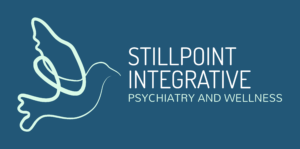Depression is one of the most common mental health challenges today, affecting millions worldwide.
While traditional approaches often focus on medication and therapy, a holistic perspective considers the interconnectedness of the mind and body.
At Stillpoint Integrative Psychiatry and Wellness, we take a comprehensive approach to treating depression, addressing the root causes and supporting overall well-being.
What Is Depression?
Depression is more than just feeling sad. It is a complex mental health condition that affects emotions, thoughts, and physical health. Common symptoms include:
- Persistent sadness or low mood
- Loss of interest or pleasure in activities
- Changes in sleep and appetite
- Fatigue or low energy
- Difficulty concentrating
- Feelings of worthlessness or excessive guilt
- Suicidal thoughts or behaviors
Depression can stem from multiple factors, including genetics, brain chemistry, life experiences, and lifestyle influences. Understanding the cause is key to developing an effective treatment plan.
The Mind-Body Connection in Depression
At Stillpoint, we recognize that mental health and physical health are deeply connected.
Research has shown that inflammation, gut health, nutritional deficiencies, and hormonal imbalances can contribute to depression.
An integrative approach includes addressing these underlying physiological factors alongside emotional and psychological support.
A Holistic Approach to Treating Depression
Rather than relying solely on medication, our integrative psychiatry model incorporates multiple evidence-based strategies to help patients regain balance and resilience.
1. Nutritional Psychiatry and Supplements
Proper nutrition is essential for brain health. Omega-3 fatty acids, B vitamins, magnesium, and vitamin D play crucial roles in mood regulation. We assess nutritional status and recommend targeted supplements when appropriate.
2. Lifestyle and Behavioral Strategies
- Exercise: Regular physical activity boosts endorphins and supports brain function.
- Sleep Optimization: Poor sleep can worsen depression. We address sleep hygiene and potential underlying sleep disorders.
- Mindfulness and Stress Reduction: Practices such as meditation, breathwork, and acupuncture can help regulate emotions and reduce stress.
3. Psychotherapy and Emotional Support
Therapy remains a cornerstone of depression treatment. Cognitive Behavioral Therapy (CBT), Acceptance and Commitment Therapy (ACT), and trauma-informed approaches help patients navigate their emotions and develop coping skills.
4. Medication Management When Needed
While we prioritize holistic strategies, medications can be a helpful tool in some cases. We use a careful, personalized approach to prescribing and adjusting medications to optimize treatment response.
Your Path to Recovery
Healing from depression is possible, and you don’t have to do it alone. At Stillpoint Integrative Psychiatry and Wellness, we offer a compassionate, whole-person approach to mental health care. If you or a loved one is struggling with depression, reach out to learn more about our integrative treatment options.
Schedule a consultation today to start your journey toward lasting wellness.

